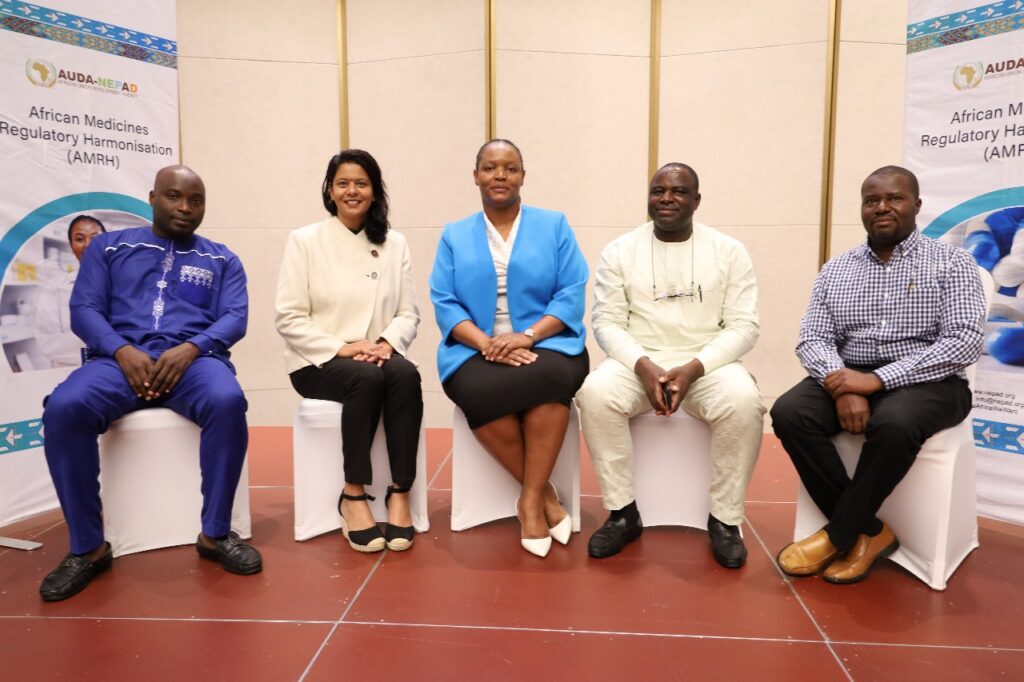
vital continental initiative.
Chair: Dr Bitrus Dasniyam Fraden – Nigeria
Vice Chair: Prof Neelaveni Padayachee – South Africa
Rapporteur: Dr Solim Aleka – Togo
Rapporteur: Dr Evans Sagwa – Kenya
By Baboloki Semele: A new continental taskforce has been launched to address the growing crisis of substandard and falsified medical products in Africa. The African Union Development Agency (AUDA-NEPAD), through its African Medicines Regulatory Harmonisation (AMRH) programme, unveiled the African Working Group on Substandard and Falsified Medical Products (SFMP) at a meeting in Addis Ababa on 10 July 2025.
The group is expected to spearhead the implementation of the first-ever Continental Plan to Combat Substandard and Falsified Medical Products, endorsed by African Union health ministers in August 2024. The plan represents a significant step in aligning national and regional efforts to improve the quality and safety of medical products across the continent, amid increasing public health concerns about the proliferation of counterfeit drugs, expired vaccines, and defective medical devices.
Speaking at the launch, Chimwemwe Chamdimba, Head of AMRH at AUDA-NEPAD, said the issue of falsified medical products is a threat to Africa’s health systems and human security. “We cannot continue to allow these products to circulate and kill our people,” she said. “They undermine the integrity of our health systems and reverse gains in disease control and treatment. It’s time Africa speaks in one voice.”
Estimates from the World Health Organization indicate that one in every ten medical products in low- and middle-income countries is either substandard or falsified. In Africa, this has translated into thousands of preventable deaths annually and over $200 million in economic losses each year, much of it due to ineffective treatments and increased burden on healthcare systems.
The new taskforce brings together public health experts, regulatory authorities, customs officials, pharmacists, and law enforcement agencies to strengthen collaboration and drive implementation of a unified approach. The group will also coordinate advocacy efforts, promote better reporting systems, and help harmonize national laws to effectively deal with trafficking and sale of falsified drugs.
Dr. Bitrus Dasniyam Fraden of Nigeria was elected chair of the working group, with South Africa’s Prof. Neelaveni Padayachee as vice chair. Togo’s Dr. Solim Aleka and Kenya’s Dr. Evans Sagwa were appointed rapporteurs. In his remarks, Dr. Fraden emphasized the importance of strategic communications, civil society partnerships, and political support. “We cannot do this alone. Governments, health professionals, and citizens must all play their part. Substandard and falsified medical products are not just a regulatory problem—they are a societal threat,” he said.
The launch follows nearly a year of consultations between AU member states, Regional Economic Communities (RECs), the African Medicines Agency (AMA), WHO, and other partners. The resulting strategy aims to increase the availability of safe, effective, and quality-assured medical products in Africa through improved regulatory oversight, legal reform, better border control, and enhanced capacity of national drug authorities.
AUDA-NEPAD officials say the taskforce will be key in building trust in African healthcare systems and boosting the credibility of local pharmaceutical production, which is expected to expand under initiatives like the African Pharmaceutical Manufacturing Plan and the African Continental Free Trade Area (AfCFTA).
The African Working Group on SFMP will meet biannually to assess progress and advise AU institutions. Its work is also expected to feed into the broader Agenda 2063 vision, particularly in strengthening Africa’s capacity to respond to health emergencies and deliver inclusive healthcare. For many public health advocates, the move represents a long-overdue shift from fragmented enforcement toward a coordinated, pan-African strategy aimed at protecting lives and ensuring health equity.